新视野大学英语第三版读写2第3单元课件
- 格式:ppt
- 大小:4.00 MB
- 文档页数:61

Book 2 Unit 3 Journey through the odyssey years奥德赛岁月之旅Most of us know about the phases of life which we label to parallel different age groups and life stages: childhood, adolescence, adulthood, and old age. We think of infancy before childhood and middle age before old age, with each unique phase bringing its own peculiar set of challenges. These challenges can be overcome by acquainting ourselves with them, such as the child's need to learn, the adult's need to find the right career and build a family, and the senior's need for support and good health care.我们大多数人都知道,根据不同的年龄和生活阶段,人生可与此平行划分为童年、青春期、成年和老年这四个阶段。
我们把这些阶段想象为婴儿期在童年之前,中年在老年之前,每个阶段都会面临一系列特有的挑战,如孩子对学习的需要,成人对找到合适的职业生涯和建立一个家庭的需要,以及年长者对得到帮助和良好医疗保健的需要。
通过对它们的充分了解,我们就可以战胜这些挑战。
Interestingly, ideas about the stages of life are changing.有趣的是,关于人生阶段的观念正在发生变化。
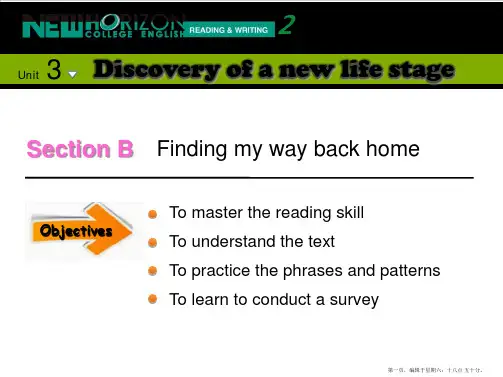
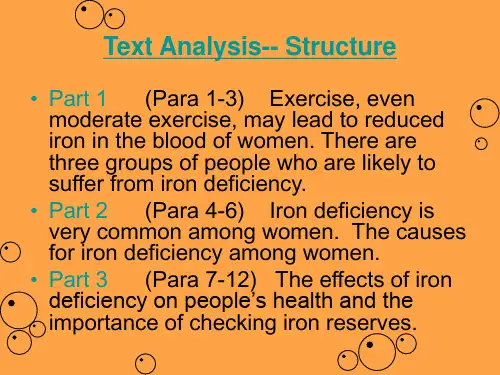
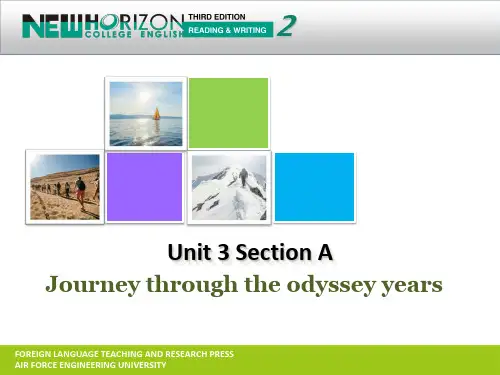
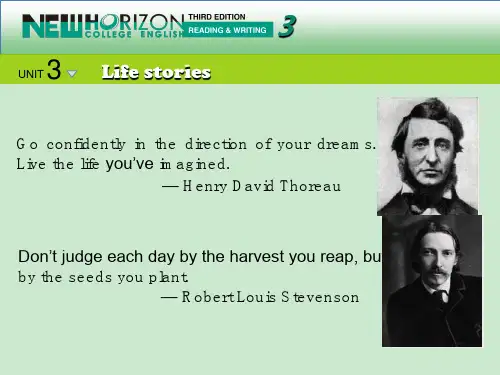

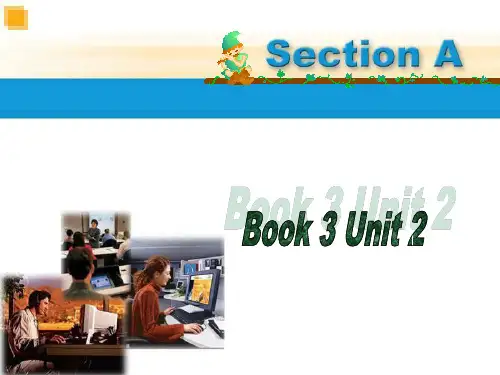
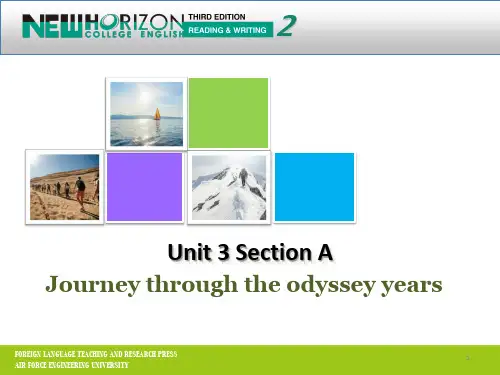

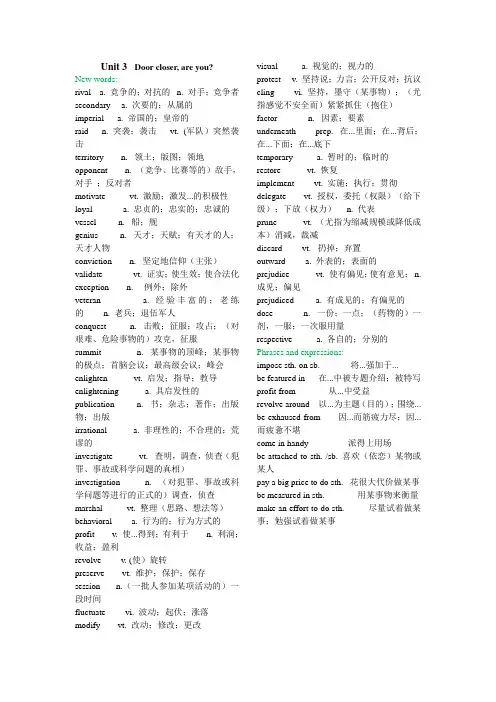
Unit 3 Door closer, are you?New words:rival a. 竞争的;对抗的 n. 对手;竞争者secondary a. 次要的;从属的imperial a. 帝国的;皇帝的raid n. 突袭;袭击 vt. (军队)突然袭击territory n. 领土;版图;领地opponent n. (竞争、比赛等的)敌手,对手;反对者motivate vt. 激励;激发...的积极性loyal a. 忠贞的;忠实的;忠诚的vessel n. 船;舰genius n. 天才;天赋;有天才的人;天才人物conviction n. 坚定地信仰(主张)validate vt. 证实;使生效;使合法化exception n. 例外;除外veteran a. 经验丰富的;老练的 n. 老兵;退伍军人conquest n. 击败;征服;攻占;(对艰难、危险事物的)攻克,征服summit n. 某事物的顶峰;某事物的极点;首脑会议;最高级会议;峰会enlighten vt. 启发;指导;教导enlightening a. 具启发性的publication n. 书;杂志;著作;出版物;出版irrational a. 非理性的;不合理的;荒谬的investigate vt. 查明,调查,侦查(犯罪、事故或科学问题的真相)investigation n. (对犯罪、事故或科学问题等进行的正式的)调查,侦查marshal vt. 整理(思路、想法等)behavioral a. 行为的;行为方式的profit v. 使...得到;有利于n. 利润;收益;盈利revolve v. (使)旋转preserve vt. 维护;保护;保存session n.(一批人参加某项活动的)一段时间fluctuate vi. 波动;起伏;涨落modify vt. 改动;修改;更改visual a. 视觉的;视力的protest v. 坚持说;力言;公开反对;抗议cling vi. 坚持,墨守(某事物);(尤指感觉不安全而)紧紧抓住(抱住)factor n. 因素;要素underneath prep. 在...里面;在...背后;在...下面;在...底下temporary a. 暂时的;临时的restore vt. 恢复implement vt. 实施;执行;贯彻delegate vt. 授权,委托(权限)(给下级);下放(权力)n. 代表prune vt. (尤指为缩减规模或降低成本)消减,裁减discard vt. 扔掉;弃置outward a. 外表的;表面的prejudice vt. 使有偏见;使有意见;n. 成见;偏见prejudiced a. 有成见的;有偏见的dose n. 一份;一点;(药物的)一剂,一服;一次服用量respective a. 各自的;分别的Phrases and expressions:impose sth. on sb. 将...强加于...be featured in 在...中被专题介绍;被特写profit from 从...中受益revolve around 以...为主题(目的);围绕... be exhaused from 因...而筋疲力尽;因...而疲惫不堪come in handy 派得上用场be attached to sth. /sb. 喜欢(依恋)某物或某人pay a big price to do sth. 花很大代价做某事be measured in sth. 用某事物来衡量make an effort to do sth. 尽量试着做某事;勉强试着做某事Door closer, are you?1 The next time you're deciding between rival options, one which is primary and the other which is secondary, ask yourself this question: What would Xiang Yu do?2 Xiang Yu was a Chinese imperial general in the third century BC who took his troops across the Zhang River on a raid into enemy territory. To his troops' astonishment, he ordered their cooking pots crushed and their sailing ships burned.3 He explained that he was imposing on them a necessity for attaining victory over their opponents. What he said was surely motivating, but it wasn't really appreciated by many of his loyal soldiers as they watched their vessels go up in flames. But the genius of General Xiang Yu's conviction would be validated both on the battlefield and in modern social science research. General Xiang Yu was a rare exception to the norm, a veteran leader who was highly respected for his many conquests and who achieved the summit of success.4 He is featured in Dan Ariely's enlightening new publication, Predictably Irrational,a fascinating investigation of seemingly irrational human behavior, such as the tendency for keeping multiple options open. Most people can't marshal the will for painful choices, not even students at the Massachusetts Institute of Technology (MIT), where Dr. Ariely teaches behavioral economics. In an experiment that investigated decision-making, hundreds of students couldn't bear to let their options vanish, even though it was clear they would profit from doing so.5 The experiment revolved around a game that eliminated the excuses we usually have for refusing to let go. In the real world, we can always say, "It's good to preserve our options." Want a good example? A teenager is exhausted from soccer, ballet, piano, and Chinese lessons, but her parents won't stop any one of them because they might come in handy some day!6 In the experiment sessions, students played a computer game that provided cash behind three doors appearing on the screen. The rule was the more money you earned, the better player you were, given a total of 100 clicks. Every time the students opened a door by clicking on it, they would use up one click but wouldn't get any money. However, each subsequent click on that door would earn a fluctuating sum of money, with one door always revealing more money than the others. The important part of the rule was each door switch, though having no cash value, would also use up one of the 100 clicks. Therefore, the winning strategy was to quickly check all the doors and keep clicking on the one with the seemingly highest rewards.7 While playing the game, students noticed a modified visual element: Any door left unclicked for a short while would shrink in size and vanish. Since they already understood the game, they should have ignored the vanishing doors. Nevertheless, they hurried to click on the lesser doors before they vanished, trying to keep them open. As a result, they wasted so many clicks rushing back to the vanishing doors that they lost money in the end. Why were the students so attached to the lesser doors? They would probably protest that they were clinging to the doors to keep future options open, but, according to Dr. Ariely, that isn't the true factor.8 Instead of the excuse to maintain future options open, underneath it all the students' desire was to avoid the immediate, though temporary, pain of watching options close."Closing a door on an option is experienced as a loss, and people are willing to pay a big price to avoid the emotion of loss," Dr. Ariely says. In the experiment, the price was easily measured in lost cash. In life, the corresponding costs are often less obvious such as wasted time or missed opportunities.9 "Sometimes these doors are closing too slowly for us to see them vanishing," Dr. Ariely writes. "We may work more hours at our jobs without realizing that the childhood of our sons and daughters is slipping away."10 So, what can be done to restore balance in our lives? One answer, Dr. Ariely says, is to implement more prohibitions on overbooking. We can work to reduce options on our own, delegating tasks to others and even giving away ideas for others to pursue. He points to marriage as an example, "In marriage, we create a situation where we promise ourselves not to keep options open. We close doors and announce to others we've closed doors."11 Since conducting the door experiment, Dr. Ariely says he has made a conscious effort to lessen his load. He urges the rest of us to resign from committees, prune holiday card lists, rethink hobbies and remember the lessons of door closers like Xiang Yu.12 In other words, Dr. Ariely is encouraging us to discard those things that seem to have outward merit in favor of those things that actually enrich our lives. We are naturally prejudiced to believe that more is better, but Dr. Ariely's research provides a dose of reality that strongly suggests otherwise.13 What price do we pay for trying to have more and more in life? What pleasure and satisfaction can be derived from focusing our energy and attention in a more concentrated fashion? Surely, we will have our respective answers.14 Consider these important questions: Will we have more by always increasing options or will we have more with fewer, carefully chosen options? What doors should we close in order to allow the right windows of opportunity and happiness to open?。

新视野大学英语读写教程(第三版)Book2 Unit 3课文讲解Section AJourney through the odyssey years Background information 1.generation groups in the westGeneration gaps,referring to difference between young people and theirelders,especially between children and their parents,have often been attributed to rapid cultural change,particularly musical tastes,fashion,culture and politics. Some special terms for different generations have thus been coined in English-speaking countries:Generation Jones:A term used to describe the generation born right after World War ||in 1945 through 1965.It's usually identified with “baby boomers”.Key characteristics assigned to these members are less optimism,distrust ofgovernment,and generally used to refer to people born in the 1960s.This generation marks the period of birth decline after the baby boom. The generation was pushed toward adulthood at an age earlier than any other recent generations. They are more ethnically diverse and better educated than the baby boomers.Generation Y:Also known as the Millennial Generation and many of them are children of baby boomers .Their birth years range from the early 1980s to the early 2000s.It's generally marked by an increase use and familiarity with communications,media,and digital technologies.Generation Z:Also known as the net or the internet Generation. In the US and other Western nations,it is a common name for the people born from the mid.1990s or early 2000s through to the present. This generation has spend their entire life with the World Wide Web and high tech gadgets.2.the odyssey yearsThe term odyssey years originated from The odyssey,a long poem by the Greek author Homer,which is a sequel of the Greek hero,Odysseus. It describesOdysseus's long journey,trying to return home from adventures and war.For English speakers,as many as for many cultures,the very name of poem,The Odyssey,has become a special term for an epic journey,or great struggle. The man character in the epic poem(史诗),Odysseus,was wandering away from home and loved ones. During his journey of 10 years,he encountered repeatedtroubles and challenges. The key insight in Odyssey is that the essentials of the journey are not only outward struggle against tremendous difficulties,but,more importantly,inward struggles leading to personal growth. His journey is the one of self-discovery and of combating his ownarrogance and pride from his young rebel heart. Therefore, it makes senseto borrow The Odyssey from Greek mythology to describe the rebellious years young people usually go through. The term odyssey year is a metaphor of this special stage for young people.Detailed study of the text1Most of us know about the phases of life which we label to parallel different agegroups and life stages childhood, adolescence, adulthood, and oldage.(Para.1)Meaning: Most of us know about he different life stages that we describe according to different age groups: childhood, adolescence, adulthood, and old age.phase:n.[C] one of the sages of a process of development or change 阶段;时期 As time are changing, we?re entering a new phase in internationalrelation.随着时代的变化,我们正进入国际关系的新阶段。